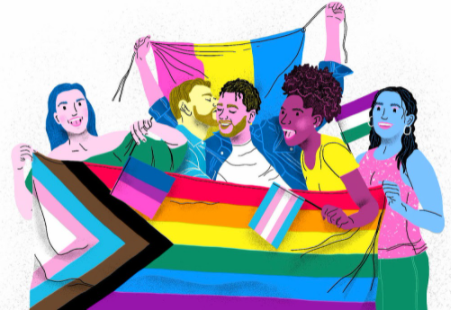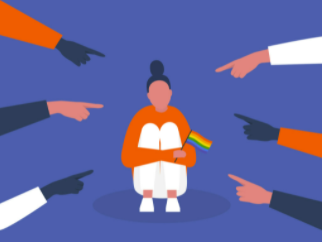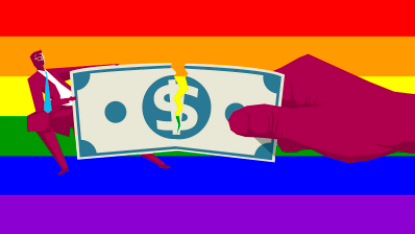How Homophobia Affects People in the LGBTQ+ Community

February 21, 2022
Homophobia is a big problem, even though we are starting to open up to LGBTQ+ problems, it can still be a huge issue even today. Homophobia can affect mental health, it can make people scared to open up about gender, or sexuality, and they can be treated unfairly.
Homophobia can greatly affect the mental health of those in the LGBTQ+ community. It can cause them to bottle up their emotions, never seek help, and hide from society. According to Stonewall, “Two in five trans people have experienced a hate crime or incident because of their gender identity.” and “More than a quarter of LGBT students (28%) say they were excluded by other students for being LGBT.” This affects our mental health in a way that causes us to feel a lack of self-worth. Because of this, trans and gay youth spend less time taking care of themselves, leading to their mental health and physical health decreasing. They start caring less and having less motivation to do simple things, like caring for themselves. In fact, “In comparison to their straight peers, members of the LGBT community, especially young adults, are far more likely to suffer from some form of mental illness because of homophobia.” says Amanda Chatel. Homophobia stops the LGBTQ+ community from having basic rights and being who they want to be in this world.

Sadly, homophobia is more common than you think in the world today. In fact, one in twelve people are homophobic in America. Saying things that make fun of people in the LGBTQ+ community can really hurt them. How would you feel if someone just randomly walked up to you, and told you who you like, or what you do is wrong, and you shouldn’t like/do that. That would be not only offensive but incredibly rude. People in the LGBTQ+ community are scared to reveal themselves, in fear that they might be discriminated against, made fun of, or even hurt because of their identity. According to an article on StoneWall, “Two in five LGBT students (42%) have hidden their identity at university for fear of discrimination.”
Homophobia is so common it can be found in everyday life, including this very school. According to one of the students at FMS who goes by they/them pronouns, “Some kids in my (disclosed information) class purposefully call me she/her just to spite me, or make fun of me. It makes me feel uncomfortable and angry that they would purposefully do that.” It’s sad to think that something like this would happen. Nobody should have to be treated like this or made fun of because of their identity.
It may be hard to believe, but in places like the workplace people in the LGBTQ+ people can be treated unfairly, whether that’s in payment, or even threatened because of their gender identity. According to an article on CAP, “The Williams Institute finds that gay and bisexual men earn 10 percent to 32 percent less than similarly qualified heterosexual men.” A lot of people focus on how women, and people of color, don’t get paid equally, and although this is true and is also a problem, not a lot of people know that people in the LGBTQ+ community can also have an unfair payment. This could mean that while a heterosexual is making about $52,000 yearly. That means people in LGBTQ are losing about $10,000 per year (That’s equal to the cost of about 20 PS5s)!
Another way LGBTQ+ people can be treated unfairly is by co-workers, or their boss talking to them differently or treating them weird. According to an article on PBS, “LGBT adults were much more likely to report being the subject of slurs or jokes (58 percent) or being rejected by a family member or friend (39 percent). A little under a third said that they had been threatened or physically attacked because of their sexuality.” This is incredibly inappropriate, especially in a professional environment. People shouldn’t be going around calling people names, rejecting people because of their sexuality, and most certainly not threatening to be attacked.
“LGBT adults were much more likely to report being the subject of slurs or jokes (58 percent) or being rejected by a family member or friend (39 percent). A little under a third said that they had been threatened or physically attacked because of their sexuality.” This is incredibly inappropriate, especially in a professional environment. People shouldn’t be going around calling people names, rejecting people because of their sexuality, and most certainly not threatening to be attacked.
Homophobia can greatly affect the health of people in the LGBTQ+ community. Going from mental health decreasing, making them scared to open up due to discrimination, and they can be treated unfairly by others. Because of homophobia, people of the LGBTQ+ communities have faced struggles with their mental health, and roughly half of students at university are scared to open up about themselves because of fear of discrimination. Homophobia is very common today, which can influence a person’s decision on coming out. Homophobia can get so bad that people in the community are treated unfairly in a professional environment. They can be called names, hurtful slurs, or even threatened to be physically attacked because of their identity. The next time you see someone making a homophobic joke, or being homophobic, say something, because it will make a difference in the long run.
Works Cited
Burns, Crosby. “The Gay and Transgender Wage Gap.” CAP, 16 Apr. 2012, www.americanprogress.org/article/the-gay-and-transgender-wage-gap.
Chatel, Amanda. “Homophobia And Its Horrifying Impact: 7 Good Reasons To End The Hate.” HuffPost, 2 Feb. 2016, www.huffpost.com/entry/homophobia-impact-_n_4889287.
“Homophobia.” teleSUR English, www.telesurenglish.net/pages/Especiales/Homophobia/en. Accessed 17 Feb. 2022.
“LGBTQ+ Facts and Figures.” Stonewall.org, 8 Mar. 2018, www.stonewall.org.uk/media/lgbt-facts-and-figures.
PBS. “1 in 5 LGBT Adults Say They’ve Been Treated Unfairly by an Employer.” PBS NewsHour, 4 Nov. 2013, www.pbs.org/newshour/nation/1-in-5-lgbt-adults-say-theyve-been-treated-unfairly-by-an-employer.




